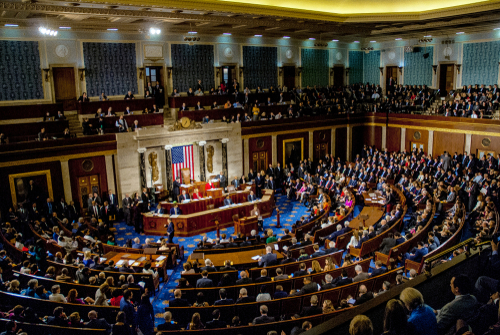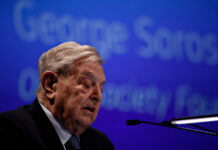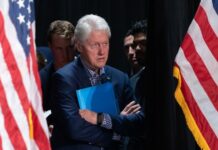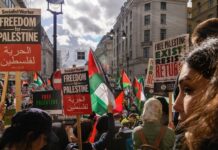
In a dramatic turn of events, Secretary of State Antony Blinken and Defense Secretary Lloyd Austin were confronted by protesters during a hearing on aid to Israel and Ukraine. The protesters, covered in fake blood, disrupted the proceedings, demanding an immediate ceasefire in Gaza. This incident underscores the growing public discontent with the U.S. government’s stance on the Israeli-Palestinian conflict.
The protesters, who accused Blinken of having ‘blood on his hands’, interrupted his testimony multiple times, waving signs calling for an end to the ‘siege’ of Gaza. The Secretary of State was labeled a ‘murderer’, a stark reminder of the high stakes involved in foreign policy decisions and their far-reaching implications.
Pro-Gaza protesters interrupted Blinken's speech to Congress several times
US Secretary of State Antony Blinken spoke before the Senate Appropriations Committee on the issue of urgent aid to Israel and Ukraine.
His speech was interrupted several times by Code Pink protesters. A… pic.twitter.com/l5Qo64uGZg
— Sprinter (@Sprinter99800) October 31, 2023
Blinken and Austin were forced to sit silently as the demonstrators chanted ‘ceasefire now’, holding up their hands smeared in red paint. This symbolic act served as a powerful indictment of the perceived U.S. complicity in the ongoing violence in Gaza.
The protest took place during a hearing on Middle East and Ukraine aid before the Senate Appropriations Committee. The interruption highlighted the contentious nature of U.S. aid to Israel, particularly in light of the recent escalation of violence in Gaza.
WATCH 🚨 US Secretary of State Anthony Blinken was repeatedly interrupted by angry protesters calling for a ceasefire in Gaza as he was providing opening remarks at a hearing before the Senate Appropriations Committee.
Video: RT pic.twitter.com/8YBhVtNzZb
— Global Updates (@worldwidestatss) October 31, 2023
The protesters’ demands for a ceasefire echo the sentiments of many Americans who believe that the U.S. should play a more active role in promoting peace in the region. The demonstration serves as a stark reminder of the need for our leaders to listen to the voices of the people they represent.
This incident underscores the importance of open dialogue and transparency in our government’s decision-making processes. It is crucial that our leaders are held accountable for their actions and that they consider the diverse perspectives of the American people.
The protest at the hearing is a clear indication of the growing public demand for a change in U.S. foreign policy towards Israel and Palestine. It is a call to action for our leaders to prioritize peace and justice in their decision-making.
In conclusion, the interruption of the hearing by Gaza protesters is a powerful demonstration of public sentiment towards the U.S. government’s stance on the Israeli-Palestinian conflict. It serves as a reminder that our leaders must listen to the voices of the people and strive for peace and justice in their foreign policy decisions.












